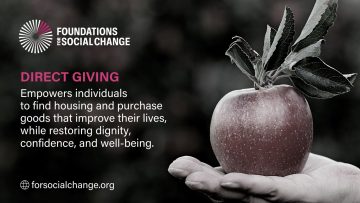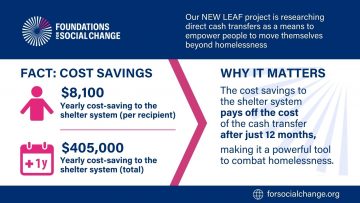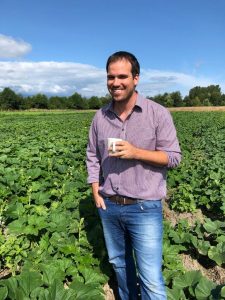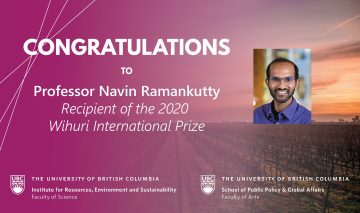ZME Science highlighted a study led by Zia Mehrabi, a research associate at IRES/SPPGA. The study shows a widening gap between small-scale farmers and those who are more technologically advanced.
To save threatened plants and animals, restore habitat on farms, ranches and other working lands
Claire Kremen, UBC IRES/Zoology prof, co-wrote about a study that found restoring native habitats to at least 20 per cent of the world’s land currently being used by humans for farming, ranching and forestry is necessary to protect biodiversity and slow species loss.
Ottawa’s climate-change policies fail to protect First Nations against food scarcity: study
“No matter what we do by 2030,” said IRES’s Kai Chain, “it’s going to get a lot worse for those northern communities, just by virtue of the inertia already in the system.” He called on the federal government to immediately redouble its efforts to reduce greenhouse gas emissions.
Woodfibre LNG and climate played a role in swinging this B.C. riding Green
Local issues can tip the balance when it comes to votes, whereas global concerns sometimes don’t, said Kai Chan, IRES prof.
Bank loans scrutinized for harm to wildlife as well as climate
Kai Chan, IRES prof and lead author of the IPBES report, was quoted about sustainable economies and the role of banks in financing economic activities that impact biodiversity.
Why all human rights depend on a healthy environment
David Boyd, IRES/SPPGA prof, wrote about the importance of placing human rights and nature at the heart of sustainable development to attain a just and sustainable future.
Science leads the way in initiative providing direct cash transfers to individuals experiencing homelessness
There are major benefits to giving money directly to individuals experiencing homelessness, shows a study by the charity Foundations for Social Change and Jiaying Zhao, professor at IRES and UBC Psychology.

Their findings counter many of the assumptions people have about homelessness and are being shared by prominent media outlets, politicians, and public figures, hopefully leading to greater humanitarian impacts.
From the get-go, Zhao and Foundations for Social Change CEO Claire Williams believed that humanitarian efforts can benefit from scientific principles. While other people were quick to ridicule the idea of cash transfers to individuals experiencing homelessness, Zhao and Williams stuck to an evidence-based approach.
“At the end of the day, this collaboration is a scientific endeavor,” said Zhao. “I was willing to accept whatever results that came out. That’s science, and you find out whether this approach works or not.”
What the study found is striking. Results show that providing a cash transfer of $7,500 to each of the 50 individuals experiencing homelessness in B.C.’s Lower Mainland allowed the recipients to move into stable housing more quickly. They retained over $1,000 more in savings over one year, spent less money on temptation goods such as alcohol and drugs, and achieved food security sooner than a control group who did not receive the cash transfer.
Importantly, the study offers the first causal evidence on the power of direct cash transfers on homelessness reduction. From a cost-benefit analysis, the $7,500 cash transfer led to a total savings of $8,172 per person per year from reduced reliance on the shelter system, resulting in a net savings of $672 per person per year. This demonstrates that the direct cash transfer approach is more cost-effective than the status quo and can save the government and taxpayers a lot of money.

This pilot project was made possible by a grant from the federal government as well as many private donors and foundations. In addition to the financial support, Zhao expressed gratitude toward UBC’s Behavioural Research Ethics Board that initially raised many questions regarding participant safety and potential risks of harm. “I understand where the Ethics Board members are coming from and am grateful for their support over the last few years,” said Zhao. “Getting approval from BREB was definitely not easy. They raised the most difficult questions but it was a good exercise for us because now we can deal with any skeptics.”
The paper will be going through peer review – another challenge that Zhao is ready to face along with the work of expanding the study. “I would invite people to join our expansion project if they are interested,” she said. “Please send us comments and feedback that can help guide our next expansion project. I would absolutely welcome that.”
Foundations for Social Change hopes to expand their project to other cities in Canada including Toronto, Montreal, Ottawa and Halifax. Since homelessness is not a homogenous problem, the team is again adopting the stance they started with. Science – including a rigorous study design, implementation, and data collection – will lead the way.
UBC researcher wins 2020 Volvo Environment Prize
In Remembrance of Adrian Semmelink
 The IRES community is mourning the sudden passing of Adrian Semmelink, who did his Master’s with Kai Chan and Terre Satterfield from 2015-2018. Adrian was a warm, enthusiastic, empathetic person who seemed to set everyone at ease with his manner and his wonderful sense of humour. He brightened every room he walked in, and touched every person who came to know him. He made the world a better place through his research on sustainable agriculture and farmer practices, and through just being Adrian. We will miss him deeply and sorely.
The IRES community is mourning the sudden passing of Adrian Semmelink, who did his Master’s with Kai Chan and Terre Satterfield from 2015-2018. Adrian was a warm, enthusiastic, empathetic person who seemed to set everyone at ease with his manner and his wonderful sense of humour. He brightened every room he walked in, and touched every person who came to know him. He made the world a better place through his research on sustainable agriculture and farmer practices, and through just being Adrian. We will miss him deeply and sorely.
To honour Adrian Semmelink and in recognition of his dedication to sustainable agriculture practices, family and friends will be establishing an award in his name. The award will support students pursuing their Master’s or PhD in UBC’s Resources, Environment and Sustainability (RES) program with preference given to those whose studies focus on sustainable agriculture. Our goal is to establish either an annual award or an endowed award. The minimum amount to establish an annual award is $10,000 to be distributed in increments over 5-10 years. We will be able to endow Adrian’s award in perpetuity if we reach $50,000. The final use of funds will be determined by IRES in consultation with Adrian’s family.
http://support.ubc.ca/adrian-semmelink
Professor Navin Ramankutty Awarded the Wihuri International Prize
UBC Professor Navin Ramankutty — of the Institute for Resources, Environment and Sustainability and the School of Public Policy and Global Affairs — has been awarded the prestigious Wihuri International Prize in recognition of his long-standing work on sustainable global food systems.

As Canada Research Chair in Global Environmental Change and Food Security, Ramankutty is a leading researcher in global sustainable land use and food systems. His research uses global data and models to understand how humans use and modify the Earth’s land surface for agriculture, to evaluate resulting global environmental consequences, and to explore solutions to the problem of improving food security with minimal environmental footprint.
In the last decade, Ramankutty’s research focused on the challenge of feeding a growing global population in ways that are more environmentally sustainable and climate resilient. He was part of the team that published a study in 2011 proposing four major solutions to achieving a doubling of available food calories while reducing agriculture’s environmental footprint.
Speaking to his process, Ramankutty said that “science is always iterative.”
“You work on what is the weakest link at that point. Ten years or twenty years ago, the weakest link was the dataset itself, so I started building global datasets of agricultural land use. While doing that, I became interested in this whole problem of food. The reason that we’re using all this land is for agriculture but that fact has all these huge environmental implications. So [my work is in] trying to understand the trade-offs: on the one hand we need food, on the other hand we have these environmental problems.”
Assessing trade-offs is also a component of Ramankutty’s work in examining the balance between biodiversity conservation and food production. In other research, he and colleagues estimated the potential impacts of climate change and extreme weather events on crop production. Along with his students, Ramankutty explores the sustainability outcomes associated with organic agriculture, urban agriculture, and small farms.
For his aforementioned contributions, Ramankutty has been awarded the 20th Wihuri International Prize by The Wihuri Foundation for International Prizes, a private institution based in Helsinki, Finland. Founded in 1953 by Finnish industrialist and sea captain Antti Wihuri, its purpose is to promote and sustain the cultural and economic development of mankind by awarding international prizes. During the past decade, the prize was awarded, for example, to researchers in the fields of atmospheric science, peace research and bioeconomics.
“The prize is really a testimony to the importance of sustainable global food systems,” said Ramankutty. “It honors all the people who work in the same field.”
The awarding process involved an eight-membered Board of Trustees selecting a topic — in 2020, they chose the global food system. It then appointed an expert committee that suggested three proposals for the recipient of the prize. The board made a unanimous decision of choosing Ramankutty as the recipient of the 2020 Wihuri International Prize.
“The Wihuri International Prize was awarded to Navin Ramankutty as a recognition of his outstanding scientific track record. In addition, we at the Wihuri Foundation for International Prizes want to highlight the urgency for sustainable solutions to the ways we produce food for the growing number of people on our planet,” said Erkki KM Leppävuori, the chairman of the Board of trustees.
The Wihuri Sibelius Prize, awarded to composers, and the Wihuri International Prize, awarded to scientists, are both worth 150 000 euros (about 235 000 Canadian dollars) and are given out, as a rule, at least every three years. This year, the Wihuri Sibelius Prize was awarded to Finnish composer Jukka Tiensuu. The Prizes were awarded in a small awarding ceremony in Helsinki, Finland on October 9th, 2020. Ramankutty attended the awarding dinner virtually and held a presentation on his research topics. In normal circumstances, the Foundation would have organized an awarding ceremony with over 800 guests. The Foundation and Ramankutty are planning his potential visit to Helsinki in 2021, bearing in mind the Covid-19 situation.
Original post written by Lindsay Marsh, SPPGA